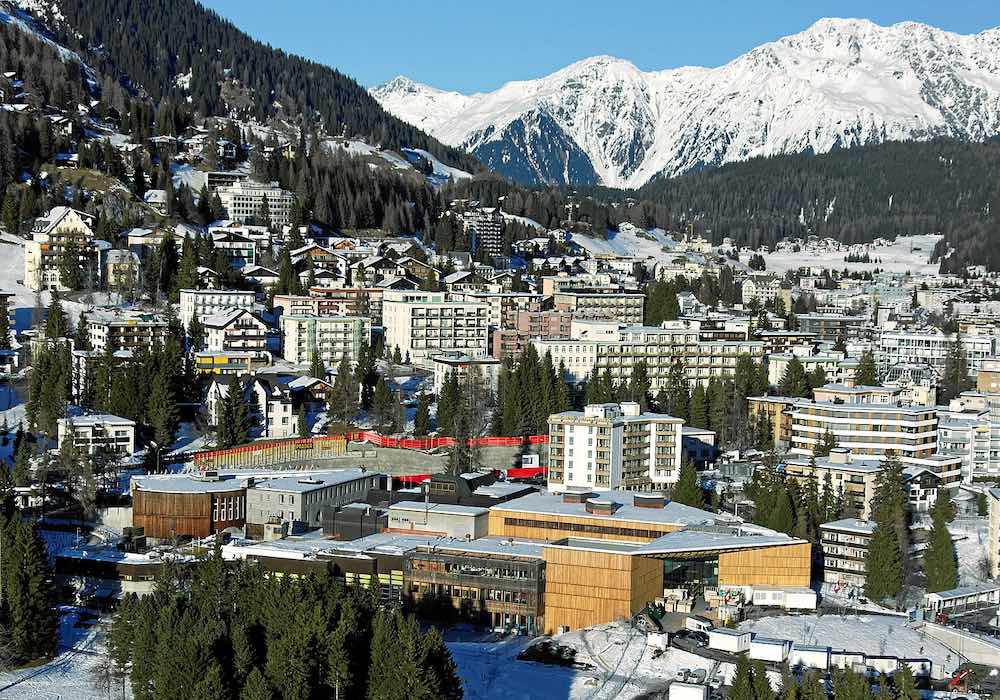ImpactAlpha, Jan. 21 – Microsoft is going beyond net-zero to “carbon negative.” Shell’s CEO is admitting the oil giant knew the risks of climate change all along and must retool for a low-carbon future. BlackRock is moving from paeans to ‘purpose’ toward stronger shareholder advocacy.
As corporate CEOs mingle with bankers and ministers at the World Economic Forum in Davos, a few corporate leaders are raising the stakes in the market-shift toward sustainability now under way.
That should make for awkward face-to-face encounters with the remainder of corporate and finance laggards. The flurry of announcements and initiatives masks the reality that most CEOs and investors at Davos and elsewhere have yet to seriously adapt their strategies and priorities to account for emerging risks, most notably climate change.
JPMorgan Chase’s Jamie Dimon may find himself on a particular hot seat with climate activists for the bank’s financing of fossil fuel infrastructure. The bank is among the top targets of activists’ new campaign, Stop the Money Pipeline.
Summit hosts have asked all participating CEOs to set 2050 net-zero emissions targets. “As a leader of one of the world’s foremost global companies and a valued partner of the World Economic Forum, we encourage you to use the opportunity of your upcoming participation to make a commitment to act on climate change,” wrote Bank of America’s Brian Moynihan and Royal DSM’s Feike Sijbesma, two World Economic Forum chairs, along with the World Economic Forum’s Klaus Schwab, in a letter to attendees.
The Climate Disclosure Project, meanwhile, unveiled its “A list” of 179 companies leading on climate disclosure and performance. Among those snagging A’s were Apple, Bank of America, Danone, Ford, Microsoft. Morgan Stanley, Nestle and Toyota. Microsoft announced last week that it would go beyond carbon-neutral to carbon-negative by 2030; by 2050 Microsoft hopes to remove all the carbon it has emitted directly or by its electric usage since it was founded in 1975.
In addition to climate change, business and government leaders will be scrutinized for their role in addressing, or exacerbating, inequality. More than 100 billionaires are expected to jet into the Swiss alpine village for the forum’s 50th anniversary. High-profile surveys, timed for release befopre the gathering, have spotlighted widening inequality, growing climate risks, and widespread distrust of capitalism.
The WEF’s Schwab this week doubled down on the stakeholder economy with an updated manifesto. “Business has now to fully embrace stakeholder capitalism,” he wrote, “which means not only maximizing profits, but [using] their capabilities and resources in cooperation with governments and civil society to address the key issues of this decade.” The W.E.F. manifesto calls for businesses to “pay their fair share of taxes” and for executive pay to reflect environmental, social and governance (ESG) performance.
“In today’s world, when you put your signature at the bottom of a paper saying I’m going to do this, this and this, you put yourself at risk. People will hold you accountable,” said former World Bank executive Bertrand Badré, CEO of Blue like an Orange Sustainable Capital, in a new ImpactAlpha podcast.
Also on hand to hold them to account: Greta Thumberg and more than 120 young activists and leaders of “uncivil” society, as Occupy Wall Street’s Micah White called the global protest movement.
“Moments of revolutionary upheaval play a social evolutionary function, enabling societies to make great progress quickly,” White wrote in a defense of his decision to attend the glitzy forum this year. “At the same time, elites at Davos are a force that wishes to adapt to the changing reality.” “
In our post-political world,” he continued, “the key distinction is not rich vs poor, as Aristotle believed. It is accelerating change vs resisting change.”











